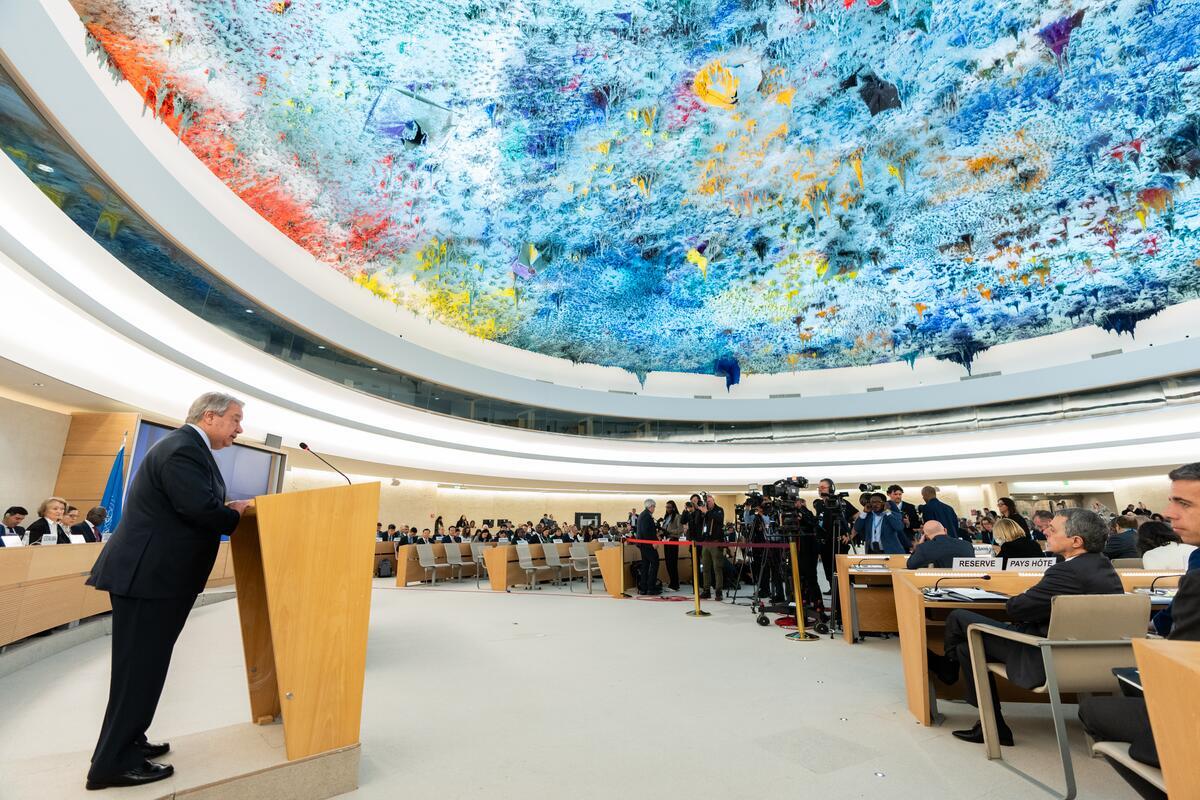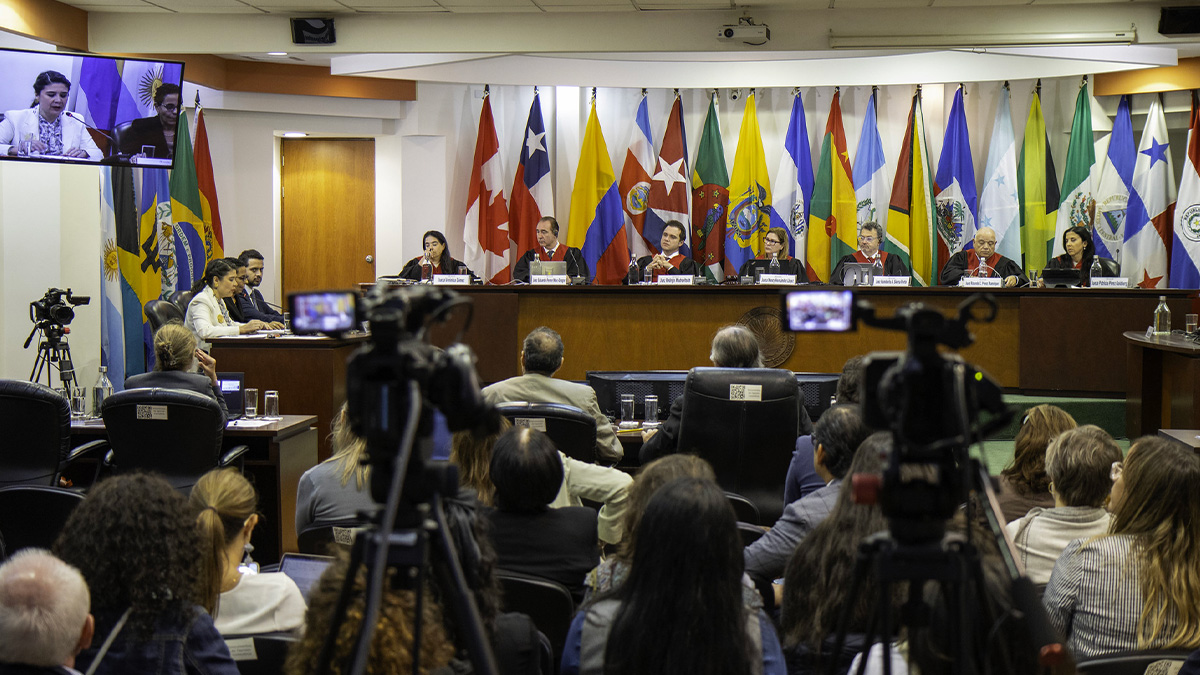Five months after the commitment established by the States Parties to the Escazú Agreement with the agenda of environmental defenders and with the need to stop the murders of people and groups that defend the environment, water and land in Latin America and the Caribbean, which is recognised as the region with the highest number of deaths worldwide; we, the individuals and organisations that make up the Public Working Group on Environmental Defenders, make an urgent call to decision makers to accelerate the establishment and implementation of the Action Plan on Human Rights Defenders in Environmental Matters, approved at the Third Conference of the Parties (COP3) of the Escazú Agreement held in Chile in April 2024.
We remind the Parties that the development of the National Implementation Plans must be carried out in a participatory manner and safeguarding the standards and principles established in the Agreement in order to faithfully comply with the provisions set forth in Article 9 of the Agreement regarding protection and the guarantee of a safe and enabling environment. In this context, it is essential that the Open-ended Working Group, composed of Chile, Ecuador and St. Kitts and Nevis, continues its work and can promote effective actions together with the countries that are already Parties to the Agreement.
With a view to COP16, we urge countries to establish clear and evident connections between the National Biodiversity Strategies and Action Plans (NBSAPs) that must be updated to comply with the commitments and achieve the targets established in the Global Biodiversity Framework and the implementation of the Escazú Agreement, and in particular with the agenda of environmental defenders. This, recognising the interdependence between the preservation of biodiversity and the safeguarding of the rights of Indigenous peoples, who for millennia have proven to be the most capable of safeguarding life.
The organisations of the Public recognise the important work of the countries that led the process of constructing the Plan of Action, together with the strong support of the Bureau and the Secretariat, which led to the approval by consensus of the Parties. To ensure full and effective implementation of the Plan of Action, it is important that the Open-ended Working Group continue its work, ideally led by the members that initiated the process, and that other countries be invited to join as soon as possible, in order to promote joint leadership on the issue.
It is now time to define the guidelines with which the States Parties will formulate their National Implementation Plans, in order to strengthen the commitment that will allow them to give strong responses with a sense of urgency, in the face of the complex and alarming situation faced by the people and groups that conserve, protect and care for the natural and cultural heritage of Latin America and the Caribbean.
Finally, we call on the countries of the region to recognise the crucial role played by individuals and groups of human rights defenders in environmental issues, considering their significant contribution to the preservation of the natural commons, and invite them to seek sustained synergies between the different agreements, and treaties of the global environmental agenda, taking into account the Climate Change Conference to be held in Belém Do Para at the end of 2025 in Brazil, which represents an important opportunity to honor the fulfillment of commitments to protect nature and those who defend it.
Life on Earth as we know it is in danger, preserving its integrity depends largely on raising the level of political commitment and ethical will to defend the environment and the rights of present and future generations.
Signatories: Working Group on Human Rights Defenders and Environmental Matters of the Escazú Agreement:
- Agua (Guatemala)
- Agora Social (México)
- Akubadaura (Colombia)
- Alianza de pueblo Indígena Ulúas Lenca y Nonualcos (El Salvador)
- Alianza Escazú (Costa Rica)
- Alianza Escazú (Guatemala)
- Alianza Mesoamericana de Pueblos y Bosques – AMPB (Guatemala)
- Ambiente y Sociedad (Colombia)
- Amnistía Internacional
- ARTICLE 19 – Oficina para México y Centro América
- Asociación Campesina de Agricultura Ancestral Maya Q’eqchi’ (Guatemala)
- Asociación de Medio Ambientalistas del Noreste AC (México)
- Asociación Espacio Encuentro de Mujeres (Panamá)
- Asociación Generaciones de Paz -ASDEPAZ- (El Salvador)
- Asociación Interamericana para la Defensa del Ambiente (Regional)
- Asociación de Abogados Ambientalistas (México)
- Biólogos por el Ambiente y la Actualización Educativa A.C. (México)
- Campus De Pensadoras Urbanas Delicias Región Centro Sur (México)
- CARBON CLICK, S.A. De C.V. (México)
- Cd Obregón sin Censura SC (México)
- Centro de Investigación y Capacitación Propuesta Cívica (México)
- Centro Mexicano de Derecho Ambiental CEMDA (México)
- Ciedur (Uruguay)
- Coalición Nacional por el Derecho a Vivir en un Medio Ambiente Sano – CONADAM (El Salvador)
- Comité Defensor del Patrimonio Histórico, Cultural y Ambiental de Puebla, AC (México)
- Comunicación y Educación Ambiental SC (México)
- Convergencia de Organismos Civiles, A.C. (México)
- Corporación de Estudios en Derecho Ambiental (CEDA) (Ecuador)
- Corporación TuCiencia (Chile)
- DECA, Equipo Pueblo (México)
- Derecho, Ambiente y Recursos Naturales – DAR (Perú)
- Derechos de la Madre Tierra Naturaleza (Chile)
- Educación ambiental a través del arte y el buen vivir (México)
- Equipo Impulsor Nacional del Acuerdo de Escazú (El Salvador)
- Espacio de Organizaciones de la Sociedad Civil para la Protección de Personas Defensoras de Derechos Humanos y Periodistas – Espacio OSC (México) Las organizaciones que integran el Espacio OSC: ARTICLE 19; Casa del Migrante Saltillo; Centro de Derechos Humanos de la Montaña Tlachinollan; Centro de Derechos Humanos Zeferino Ladrillero (CD-HZL); Centro Mexicano de Derecho Ambiental (CEMDA); Centro Nacional de Comunicación Social (Cencos); Comunicación e Información de la Mujer A.C. (CIMAC); Consorcio para el Diálogo Parlamentarios y la Equidad Oaxaca Consorcio Oaxaca); Instituto de Derecho Ambiental (IDEA), Red Nacional de Organismos Civiles de Derechos Humanos Todos los Derechos para Todas, Todos y todes (RedTDT); SMR: Scalabrinianas, Misión con Migrantes y Refugiados; Servicios y Asesoría para la Paz (Serapaz). El Espacio OSC está acompañado por Brigadas Internacionales de Paz (PBI) -Proyecto México.
- Fondo Plurales (Argentina)
- Forum Solidaridad (Perú)
- Fundación CONVERGER ONGD (Colombia)
- Fundación Procanticus (Colombia)
- Funsalprodese (El Salvador)
- Grupo Gema del Mayab AC (México)
- Grupo Impulsor Nacional R2250 (El Salvador)
- IDAMHO (Honduras)
- IDHEAS, Litigio Estratégico en Derechos Humanos (México)
- Impacto Positivo (México)
- Iniciativa de Acceso México – IAMex (México)
- Iniciativas para el Desarrollo de la Mujer Oaxaqueña (IDEMO) (México)
- La Ventana (México)
- Legisladores x el Ambiente (Argentina)
- Liga de Defensa del Medio Ambiente (Bolivia)
- Mexico Sin Ecocidio (México)
- Moce Yax Cuxtal (México)
- Moce Yax Cuxtal Ac (México)
- Movimiento Ambientalista Santabarbarense MAS (Honduras)
- Movimiento Mujeres Luna Creciente (Ecuador)
- Movimiento Tzuk Kim-pop (Guatemala)
- Naturaleza y Cultura Sierra Madre (México)
- Onamiap (Perú)
- Oxígeno Verde (México)
- Pastoral de la Tierra VEPH – Caritas Arquidiócesis de San Salvador (El Salvador)
- Plataforma Internacional contra la Impunidad (Suiza)
- Plataforma Regional de Defensores y Defensoras de la Tierra – ILC
- Pojoaju-Asociación de ONG (Paraguay)
- Proyecto sobre Organización, Desarrollo, Educación e Investigación PODER (México)
- Puerto Morelos Sustentable (México)
- Red de defensoras del ambiente y el Buen Vivir de Argentina (Argentina)
- Red Nacional por la Defensa de la Soberanía Alimentaria en Guatemala – REDSAG
(Guatemala)
- Red Nicaragüense de Comercio Comunitario – RENICC (Nicaragua)
- Redes Por La Diversidad, Equidad Y Sostenibilidad A.C. (México)
- REMAM (El Salvador)
- Rhizomatica Communications (Estados Unidos)
- Universidad Autónoma de Guerrero (México)
- Valle del Mayo (México)|
- Visión Compartida AC (México)
- Voces Ecológicas COVEC (Panamá)
- Voces Rurales Vida y Prevención (Guatemala)




